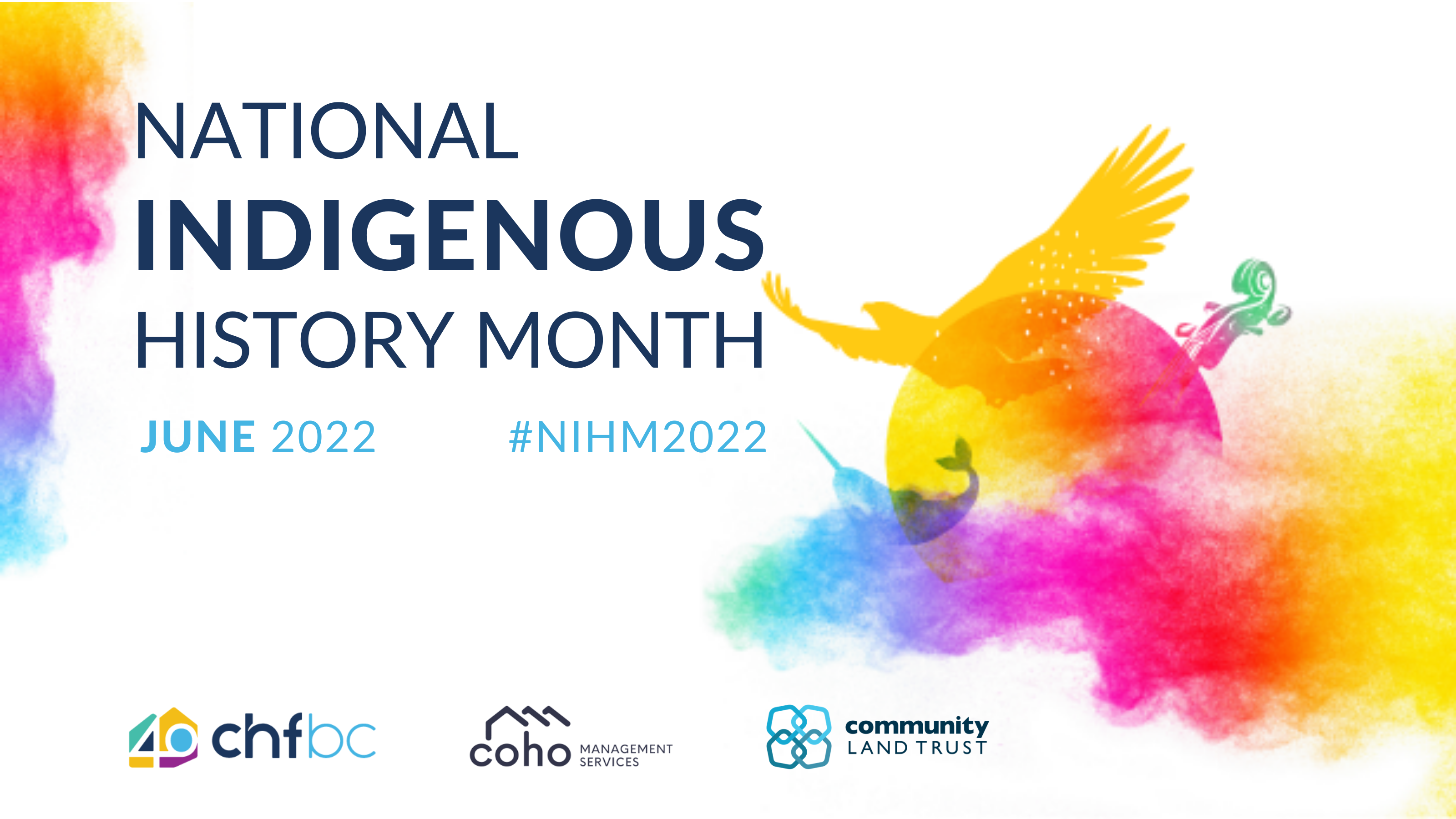
June is National Indigenous History Month
Each June, CHF BC—and its group of social purpose enterprises—commemorates National Indigenous History Month.
This month invites Indigenous Peoples to celebrate their history in the spirit of pride and preservation. For non-Indigenous Canadians, it is an opportunity to learn and show recognition of the role Indigenous Peoples have played and continue to play in shaping Canada. Recognizing the land we are on, learning Indigenous greetings and supporting Indigenous businesses are a few additional ways you can show their support for this day.
CHF BC acknowledges and pay our respect to the Indigenous keepers of the traditional and unceded lands upon which our office and many housing co-operatives are situated: the xʷməθkʷəy̓əm (Musqueam), Sḵwx̱wú7mesh (Squamish), sʔəl̀ilwətaʔɬ, (Tsleil-Waututh), WSÁNEĆ (Saanich), and lək̓ʷəŋən (Lekwungen)-speaking Peoples. We recognize that our presence here today was paved through a system of discriminatory and racist practices.
We also acknowledge that Canada’s colonial and present has a lasting and negative impact on Indigenous communities. The legacies of residential schools, the 60s scoop, and ongoing colonization including resource theft and socio-economic conditions like poverty often fall the hardest on women and gender diverse people. We are committed to honoring, listening, and continuously learning from the diverse perspectives of these and all Indigenous Peoples.
Our Commitment and Journey
We know that one month cannot erase or atone for centuries of violence and colonization. Lasting change requires an ongoing commitment to learning and action based on justice, respect, and equality. We encourage everybody to use this month as an opportunity to renew our collective commitment to these important principles.
CHF BC is dedicated to the principles of anti-racism and an end to racial discrimination. While some progress has been made, Indigenous peoples in Canada still face racism and discrimination every day.
We are taking action on this work through our strategic priority of ‘belonging.’ To this end, we are committed to listening, learning, and changing.
We are also committed to amplifying the voices of our members, friends, and partners so that inclusivity becomes the norm in our world. We aim to inspire housing co-ops to be communities that promote and embody equitable access, opportunity, respect, and a sense of belonging for everyone by:
- Working with housing co-ops to identify and work to remove barriers to equity and inclusion;
- Modeling best practices to promote equity and inclusion and to increase diversity among CHF BC directors, staff, workshop leaders, contractors, and consultants; and,
- Reviewing and refreshing our education program, management services and development practices to reflect this strategic priority.
- Holding events and activities focusing on justice, equity, respect, and equity.
Learn more about our reconciliation and decolonization work
An example of our journey towards justice, respect, and equity, CHF BC recently learned that our flagship publication had a name that could be a trigger for harm or trauma for Indigenous People. Once this fact was brought to our attention, we publicly acknowledged this fact and changed the name of the publication. A description of this learning journey can be found in the first story of Co-op Foundations, our newly renamed publication
Another example of our journey is the following workshop that will take place later this month.
Event
Reframing our Worldview – Honouring Indigenous History and Experience
June 20, 6:00 p.m. – 7:30 p.m. PDT

As part of our journey towards truth, reconciliation, and decolonization, we have invited Kevin Barlow, a Mi’kmaw from Indian Island First Nation in New Brunswick to lead a workshop on June 20th. Kevin now resides in North Vancouver where he works to build capacity of mostly Indigenous non-profit organizations.
His free workshop will give us a better appreciation of the impact of Indigenous history on our society today. Participants will be offered a different worldview that can help co-ops and organizations that serve co-ops reframe their awareness and possible biases that may conflict with Indigenous historical experiences.
This session will go beyond telling about Indigenous history to providing tools and strategies that non-Indigenous people may use to self-assess possible biases and gain a stronger understanding of the richness of the Indigenous history in Canada.
Resources

- National Indigenous History Month website
- Celebrating Indigenous Peoples in Canada: Learning and activity guide (Government of Canada)
- June is National Indigenous History Month. So, what’s it all about? (CBC Kids)
- 35 books to read for National Indigenous History Month (CBC)
- VIDEO: Leading Change: Equity, Diversity, Inclusion and Belonging 2021 Housing Central Conference Session
- #NIHM2022 – National Indigenous History Month on Twitter
- BCNPHA Reconciliation and Decolonization resources
- AHMA’s BC Urban, Rural and Northern Housing Strategy, 2022
Truth and Reconciliation Calls to Action
- See the 94 calls to action: Truth and Reconciliation Commission of Canada: Calls to Action
- Sign the petition: Call for Action on Truth and Reconciliation
- Learn more at the National Centre for Truth and Reconciliation
Online Courses
- Indigenous Canada – Ongoing University of Alberta online course through Coursera
- Indigenous Cultural Competence and Humility – from the Indigenous Reconciliation Group
- Cultural Safety Planning – from Nahanee Creative
- Indigenous Perspective Workshop Series (BCNPHA)
- Understanding History, August 17
Led by Indigenous Perspectives Society - Dispelling Myths and Stereotypes, August 31
Led by Indigenous Perspectives Society - Building Local Relationships, September 20
Led by Indigenous Perspectives Society
- Understanding History, August 17
More resources can be found on our Reconciliation and Decolonization page.

